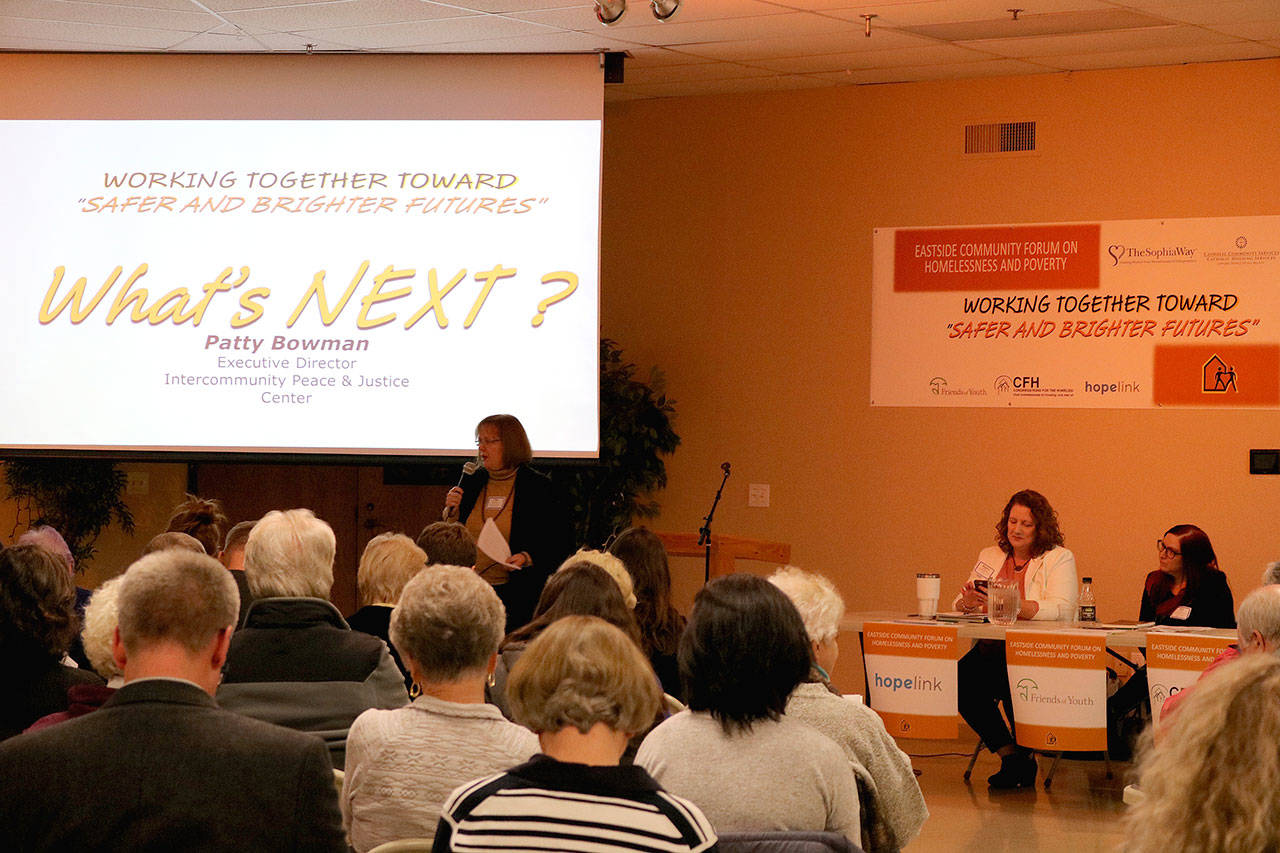Nearly 100 people gathered at St. Jude Catholic Church in Redmond on Oct. 28 for a community forum on homelessness and poverty.
The forum aimed to identify homelessness and poverty, propose solutions to transition people out of homelessness faster and organize community task force groups.
The Eastside Community Forum on Homelessness and Poverty was hosted by St. Jude and facilitated by Molly Boll. Attendees included Eastside faith communities, mayors and councilmembers, college and school district representatives and corporate executives.
Speakers from Hopelink, Friends of Youth (FOY), Congregations for the Homeless (CFH), The Sophia Way and Catholic Community Services (CCS) led attendees in understanding their programs and made two recommendations to help transition people out of homelessness.
Hopelink vice president, Meghan Altimore said half the people they serve have an income of less than $10,000. She shared that people in King County need to earn 300 percent of the federal poverty level to meet their basic needs. In King County, there are 700,000 people living under the poverty level and on the Eastside, 100,000 people live under that line, according to Altimore.
“Homelessness and poverty cannot be unlinked…There are various reasons why people are homeless but at the core, it is a lack of resources,” she said.
Hopelink offers services that help with access to food, transportation, stable housing and access to a living wage. Altimore’s two recommendations to transition people out of homelessness is to have affordable housing at all levels with government intervention and community attitudes changed toward density and affordable housing and to have living-wage job opportunities for people entering or re-entering the workforce.
FOY assistant director of shelter, outreach and support services Jess Wood said many of the youth that come to their organization come maintaining employment and are enrolled in school.
FOY is the only youth-specific emergency shelter on the Eastside. The organization’s services include street outreach services, drop-in services, host home programs, community-based case management services and transitional housing. Wood shared with the audience that she not only works with homeless youth but that she was a youth who experienced homelessness.
“The youth that access our programs are strong…They’re resilient and courageous young people,” she said.
Wood suggested that the Host Homes program would help provide youth with safe, stable and short-term housing as they work toward becoming more self sufficient. Host families must pass a background and reference check. Wood also suggested that internship programs will help youth learn life and employment skills that lead to long-term employment.
David Bowling, executive director of CFH said their mission is to partner with men in the community to help them find a path from homelessness to stable living. He said everything they do is on the foundation of relationship.
“It’s the key,” he said. “Relationship is where transformation occurs…we create authentic and accepting relationships with the men.”
Bowling said CFH serves about 2,000 individuals year round. At CFH, men are able to access the day center seven days a week, year-round shelter and case management. CFH also partners with Hopelink. Bowling said homelessness has been around for years but it’s growing. He said it’s the gap between living wages and affordable housing that keeps the gap growing. Bowling echoed Altimore’s recommendation of government intervention and added that affordable housing is the answer to homelessness.
The two recommended solutions he shared with the audience were mandatory education and educational classes. He said providing education for community members will hopefully result in greater community awareness to be able to address the homelessness issue.
Alisa Chatinsky, interim executive for The Sophia Way, said the most important thing community members can do is “[put] our heads together and our hearts together, [put] a plan together, and [get] to work.”
The Sophia Way offers a day center, an extended-stay shelter, emergency shelter, housing, housing case management and a street outreach program.
Chatinsky said 30 percent of the women they serve are older than 55 and 80 percent of the women say they are experiencing homelessness for the first time.
Chatinsky’s two recommendations were to increase rental assistance funding and to determine how to develop a master leasing program to provide women with more permanent shared housing.
Bill Hallerman, agency director for CCS said “we” cannot end homelessness in the community without a new huge commitment to affordable housing and subsidized housing.
“It’s going to take the federal government, the local government, businesses and nonprofits to work together to make a difference,” he said.
Hallerman said CCS helped 11,000 people in King County into permanent housing but 25,000 new people came to them, homeless, asking for help for the first time.
“As fast as we stabilize folks, the back door fills up with more folks that need help,” he said.
Hallerman’s two suggestions included the diversion services program, which offers one-time assistance for people’s housing crisis, and the aspiring social service employee training program, which offers a wraparound employment preparation course.
Sister Betty Schumacher from St. Jude also spoke on their Safe Parking program.
To conclude the forum, attendees were asked to fill out a questionnaire to help plan the next steps toward solving homelessness on the Eastside.


